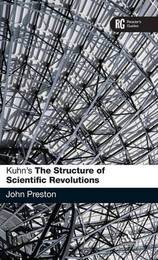
|
Kuhn's 'The Structure of Scientific Revolutions': A Reader's Guide
Hardback
Main Details
| Title |
Kuhn's 'The Structure of Scientific Revolutions': A Reader's Guide
|
| Authors and Contributors |
By (author) Dr John Preston
|
| Series | Reader's Guides |
|---|
| Physical Properties |
| Format:Hardback | | Pages:136 | | Dimensions(mm): Height 216,Width 138 |
|
| Category/Genre | Philosophy of science |
|---|
| ISBN/Barcode |
9780826493750
|
| Classifications | Dewey:501 |
|---|
| Audience | |
|---|
|
Publishing Details |
| Publisher |
Bloomsbury Publishing PLC
|
| Imprint |
Continuum International Publishing Group Ltd.
|
| Publication Date |
7 June 2008 |
| Publication Country |
United Kingdom
|
Description
Thomas Kuhn's The Structure of Scientific Revolutions is arguably one of the most influential books of the twentieth century and a key text in the philosophy and history of science. Kuhn transformed the philosophy and history of science in the twentieth century in an irrevocable way and still provides an important alternative to formalist approaches in the philosophy of science. In Kuhn's 'The Structure of Scientific Revolutions': A Reader's Guide, John Preston offers a clear and thorough account of this key philosophical work. The book offers a detailed review of the key themes and a lucid commentary that will enable readers to rapidly navigate the text. The guide explores the complex and important ideas inherent in the text and provides a cogent survey of the reception and influence of Kuhn's work.
Author Biography
John Preston is Senior Lecturer in Philosophy at the University of Reading. Previous publications include Feyerabend: Philosophy, Science and Society (Polity, 1997) and Thought and Language (ed.) (CUP, 1997).
Reviews'This richly succinct guide to The Structure of Scientific Revolutions, T.S. Kuhn's hugely influential book, combines a lucid and subtle presentation of its main themes with an incisive and probing assessment of its reception and significance.' Vasso Kindi, Department of Philosophy and History of Science, University of Athens, Greece 'Preston's book admirably illuminates the most philosophically compelling and enduring elements of Kuhn's thought without diluting their complexity or sidestepping their perplexing consequences.' Matthew Lund, Department of Philosophy and Religion, Rowan University, USA
|